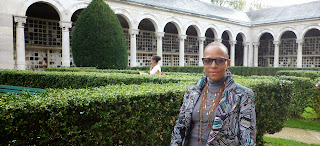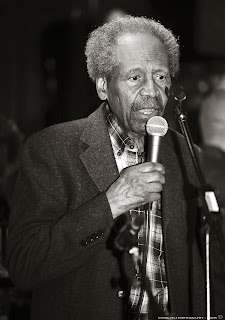On October 4, 2013, funeral services for James A. Emanuel were held in a chapel at the Père Lachaise cemetery Colombarium. Friends gathered outside while waiting to be ushered to the chapel.
Gathering at the Colombarium
© Discover Paris!
Wendy Johnson and Gary Lee Kraut
© Discover Paris!
Jim Haynes
© Discover Paris!
Kim Powell
© Discover Paris!
Tom McKenzie and Bobby Few
© Discover Paris!
Nicole Mathieu, Chansse Evans, Bobby Few, and Wendy Johnson
© Discover Paris!
Chansse Evanns
© Discover Paris!
The ceremony was led by Gary Lee Kraut, who read a poem written by James' nephew, Jim Smith. Later during the program, he read James' poem "Lovelook Back."
Gary Lee Kraut
© Discover Paris!
Chansse Evanns performed a saxophone solo.
Chansse Evanns plays a saxophone solo
© Discover Paris!
Several additional poems by James were read by Ricki Stevenson ("The Treehouse"), Wendy Johnson ("Emmett Till"), Brandyn Barbara Artis ("Jazzanatomy"), and Ariane Selassie Crochet ("L'Artiste à Ma Fenêtre" - French translation by Godelieve Simon of "Artist at My Window").
Ricki Stevenson
© Discover Paris!
Wendy Johnson (standing)
© Discover Paris!
Brandyn Barbara Artis
© Discover Paris!
Ariane Selassie Crochet
© Discover Paris!
Julia Wright was unable to attend the ceremony. She has graciously allowed me to reprint the tribute that she wanted to make that day:
Barbara Chase-Riboud read her poem "Requiem."
Barbara Chase-Riboud
© Discover Paris!
Attendees were then invited to recount their stories about James or otherwise remember him.
Finally, Wendy Johnson read James' poem "'We Shall Overcome': A Smile for the 1960s".
Wendy Johnson
© Discover Paris!
The ceremony ended with the song "We Shall Overcome" by Joan Baez.
After the service, the casket was taken away and James' remains were cremated.
The disposition of the remains took place on Monday, October 7, 2013. James' remains were placed in Niche 16412** in Corridor K on the second underground level (2ème sous-sol) of the Colombarium. Flowers were laid.
Niche 16412
© Discover Paris!
Jake Lamar spoke a few words of remembrance and then read James' poem "Deadly James."
Jake Lamar reads "Deadly James"
© Discover Paris!
The ashes were then sealed into the niche.
Plaque for James A. Emanuel
© Discover Paris!
The quotation on the stone comes from James' poem "Mysteries, I," published in The Force and the Reckoning (reprinted with permission by Jim Smith):
*Richard Wright's remains are in Niche 848; it is found on the western wall of the Colombarium arcade.
**James Emanuel's niche is directly beneath the niche of Darling Légitimus, the famed Martinican actress, and Gérard Légitimus.
************
If you like this posting, share it with your friends by using one of the social media links below!
© Discover Paris!
© Discover Paris!
© Discover Paris!
© Discover Paris!
© Discover Paris!
© Discover Paris!
© Discover Paris!
The ceremony was led by Gary Lee Kraut, who read a poem written by James' nephew, Jim Smith. Later during the program, he read James' poem "Lovelook Back."
© Discover Paris!
Chansse Evanns performed a saxophone solo.
© Discover Paris!
Several additional poems by James were read by Ricki Stevenson ("The Treehouse"), Wendy Johnson ("Emmett Till"), Brandyn Barbara Artis ("Jazzanatomy"), and Ariane Selassie Crochet ("L'Artiste à Ma Fenêtre" - French translation by Godelieve Simon of "Artist at My Window").
© Discover Paris!
© Discover Paris!
© Discover Paris!
© Discover Paris!
Julia Wright was unable to attend the ceremony. She has graciously allowed me to reprint the tribute that she wanted to make that day:
Welcome, here, dear Brother James, to the diaspora Pantheon of Expatriate African-American Writers. Richard Wright, my father, is a few yards away* to greet you. I imagine both of you story-telling and haiku-spinning through time. Ancestors now.
You are the last of the generation of our fathers who chose expatriation to live, write, love and die on their own terms. That is what you did, a discrete jeweler of our blues, a giant amongst giants. And now an ancestor like Richard Wright, Stretch Johnson, Nina Simone and the others who knew how to create an intersection between their personal pain as black men and black women - and the larger History with a capital "H." Between our literary history and McCarthyism for instance. I remember our laughing to tears at your favorite café as we exchanged Black List stories....
My father and you were both African-American literature pioneers, the first to transpose the Haiku form into the language of back home. You are home now.
You also shared another sensitivity in common with Richard, who had saved the life of an African-American musician scheduled to die on the electric chair back in the forties. So when I approached you fifty years later and asked you to help us save Mumia's life, you did not hesitate. You lived long enough to hear that through an international movement buttressed by your own generosity, Mumia has escaped the death sentence. Stretch helped us put ten thousand French people in the streets of the City of Lights and you sent Mumia a Haiku of Hope every month beautifully illustrated by Godelieve, a gesture of such beauty and constance that the prison administration tried to put an end to it.
Thanks on behalf of Mumia, my Brother.
Meanwhile you are at last meeting up with your own son, your son lost when he was so young at the mercy of a violence so unnameable that only your poetry could redeem a lifetime mourning.
You are now reunited. Bless both of you.
Love,
Julia
Barbara Chase-Riboud read her poem "Requiem."
© Discover Paris!
Attendees were then invited to recount their stories about James or otherwise remember him.
Finally, Wendy Johnson read James' poem "'We Shall Overcome': A Smile for the 1960s".
© Discover Paris!
The ceremony ended with the song "We Shall Overcome" by Joan Baez.
After the service, the casket was taken away and James' remains were cremated.
The disposition of the remains took place on Monday, October 7, 2013. James' remains were placed in Niche 16412** in Corridor K on the second underground level (2ème sous-sol) of the Colombarium. Flowers were laid.
© Discover Paris!
Jake Lamar spoke a few words of remembrance and then read James' poem "Deadly James."
© Discover Paris!
The ashes were then sealed into the niche.
© Discover Paris!
The quotation on the stone comes from James' poem "Mysteries, I," published in The Force and the Reckoning (reprinted with permission by Jim Smith):
She slipped me a kiss:
for years my fresh secret. Why
do I tell you this?
No plant lover, yet
I water it, give it sun.
What risk do I run?
Inside a smooth stone,
without smashing it open
I found this. Just think.
*Richard Wright's remains are in Niche 848; it is found on the western wall of the Colombarium arcade.
**James Emanuel's niche is directly beneath the niche of Darling Légitimus, the famed Martinican actress, and Gérard Légitimus.
Entrée to Black Paris!™ is a Discover Paris! blog.
If you like this posting, share it with your friends by using one of the social media links below!



























